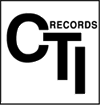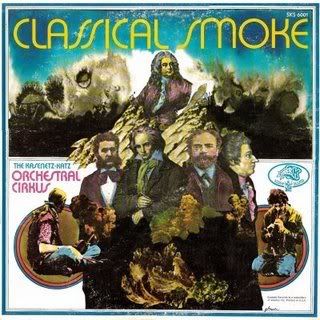A successful record label becomes so usually due to effective branding. CTI (Creed Taylor International) is an excellent example. CTI was founded in 1967 by Creed Taylor, father of both the Impulse and Verve labels. Hip hop heads will be familiar with several of their imprints; Freddie Hubbard's Red Clay, sampled in A Tribe Called Quest's "Sucka Nigga," as well as Bob James' LP One, which includes the single Nautilus. According to The-Breaks.com, Nautilus has been sampled on nearly sixty-four different hip-hop tracks, including three by Pete Rock & C.L. Smooth, two by Mary J. Blige, and at least one by the Geto Boys, Large Professor, The Jungle Boys, Run-DMC, Public Enemy and Ultramagnetic MCs. CTI's entire stable of jazz-fusion artists has been widely sampled, and its influence over the Hip Hop world was perhaps best expressed when The People Under the Stairs created a logo for their albums that consciously mimicked the CTI imprint:


Another label that seems to have existed for the sole purpose of providing sample material for hip hop producers thirty years later is Buddah Records. Buddah was started in 1967 by a promoter named Neil Bogart, and much of their early material was throwaway 60s sugar-pop. The first Buddah 7" was "Yes, We Have No Bananas" by the Mulberry Fruit Band, and the 1910 Fruitgum Company's inane "Yummy Yummy Yummy" followed soon after. However, Buddah ran or distributed for several smaller subsidiaries. In addition to its own Karma Sutra imprint, Buddah distributed for Curtis Mayfield's Curtom label as well as the Isley Brothers' T-Neck Records. After Gladys Knight and the Pips were released from their Motown contract, Buddah signed them for several LPs during the 1970s, releasing some of their most sampleable material, including the 1973 cut Window Raisin' Granny.
In many ways, Buddah Records is a reflection of the best and the worst of the hippie counterculture. It is difficult to imagine how a label could so bluntly brand itself as an exotic, psychedelic mindfuck a la Tantric Buddhism, and yet manage to misspell both "Buddha" and "Kama Sutra." But Bogart's demographic wasn't Zen monks, it was stoned white people who didn't know the difference and didn't care. What they did care about was trippy shit like sitar solos, echo effects, reversed vocals etc. One of the things that the hippie outlook shares with hip hop is the desire to reinvent and restyle previous generations' music. In the case of hip hop this reinterpretation is implicit. Hip hop, by definition, is redefinition. But hip hop is not the first cultural movement to attempt to recontextualize musical artifacts.
Psychedelic rock music, in addition to being freaky for freaky's sake, seems in many cases to owe a significant debt to classical European chamber music. One need look no further than Sgt. Pepper's Lonely Heart's Club Band, but artists like Spirit, 7 Do Eleven and Lighthouse provide the corroborating testimony. Buddah Records was at the forefront of the Psychedelic Chamber Rock wave, and this is nowhere more evident than in its 1969 release Classical Smoke by the Kasenetz-Katz Orchestral Circus. With the exception of the B-Side's Orgy of Lust, the album is a fully orchestrated psychedelic rock re-imagining of Beethoven, Mozart, Wagner, Strauss and other "culturally significant" music. It is in this way conceptually similar to a DJ mixtape, and, not surprisingly, ripe with sample material.

The Psychedelic Rock movement was not able to sustain itself creatively. By the end of the 70s, and perhaps before, the stream had dried up and given way to a weedy swamp of disposable hair-metal. Pink Floyd and Led Zeppelin are in a way like the Pac and Biggie of 70s rock. The movement didn't end with them, but originality and creativity were pushed underground and the radio became full of glossy, empty posturing. For me, artists like TI are the Eddie Van Halen of hip hop; well suited to the times and even likable in certain situations, but ultimately empty and destined for irrelevance.
As the economy tanks and Hummer goes out of business, it is important to remember that when times are too hard for bullshit like Gucci bandanas, things like booze and marijuana are stable. So people are always going to be looking for the real shit, that smoke a blunt shit, whether its Biggie or the Beatles, Big Daddy Kane or the Kasenetz-Katz Orchestral Circus. Can you dig it?



